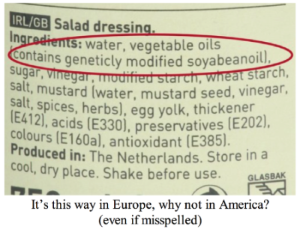The Crusade in Favour of GMO: Falsehoods and Vilification will not Fool the Public

Pro-GMO
campaigners often attack critics of the technology by claiming their
negative views of it emanate from well-funded environmentalist groups or
commercial interests in the organic food sector. The assertion is that
such bodies promote falsehoods and scaremongering about GM to protect
their own interests and that the GMO agritech sector has fallen victim
to this.
Another
claim is that critics rely on quackery on the internet or on some form
of discredited science that is only carried out by those whom the
‘scientific community’ has seen fit to marginalise due to ‘bad’ science
and a perceived political agenda.
The gist of the argument
is that pseudo-science and a powerful ideologically motivated group are
holding the world to ransom by conspiring to mislead the public and
prevent the spread of GM, which according to pro-GMO activists, is
denying the poor and hungry of the world access to food.
 In a recent piece on
Huffington Post, Jon Entine followed a similar line of attack to
denigrate Rachel Parent, her family’s business interests and the
campaign which she heads, Kids Right To Know (KRTK). He calls Parent a
well-polished ‘crusader’ against GM food. He also argues that on the
KRTK website, there is a stream of studies cited that raise concerns
about GM, but which, according to Entine, are predictably and
conveniently labelled as being mostly a combination of fringe research
and a collection of discredited, misconstrued and biased studies.
In a recent piece on
Huffington Post, Jon Entine followed a similar line of attack to
denigrate Rachel Parent, her family’s business interests and the
campaign which she heads, Kids Right To Know (KRTK). He calls Parent a
well-polished ‘crusader’ against GM food. He also argues that on the
KRTK website, there is a stream of studies cited that raise concerns
about GM, but which, according to Entine, are predictably and
conveniently labelled as being mostly a combination of fringe research
and a collection of discredited, misconstrued and biased studies.
Entine
claims to present a “well-reasoned critical analysis” of Rachel
Parent’s views by referring readers to a blog, where we are informed
there are hundreds of independent studies on GM and they all show
safety. During his lengthy attack, he concludes that Rachel Parent is a
tool for vested interests.
Entine himself has a history of ‘hit’ pieces against
prominent figures. If he wants to talk about people posing as a tool
for vested interests, he is on very thin ice indeed in terms of his own
situation: see “the making of an agribusiness apologist“. Indeed, that ice melted long ago to expose his lack of objectivity or credibility as an ‘independent’ analyst.
It should be made clear that opposing GM
is not affecting the world’s ability to feed itself. Feeding the world
is first and foremost a political issue. We hear much about the
potential of GM, but the reality is that GM crops have been fraudulently placed on the commercial market, have contributed nothing to alleviating food poverty or food insecurity (have actually undermined it) and have caused a great deal of damage to health and the environment and livelihoods too.
The path to feeding the world lies in
helping smallholder farmers to develop their (non-GMO) methods in the
Global South, where the majority of hungry people live. These farmers
are the backbone of global food production.
It also depends on challenging rigged trade, neo-liberal economics,
structural inequalities and food commodity speculation, among other
issues (see this).
We
now have food surplus countries in the West which mirror food deficit
areas elsewhere, of which the latter have become dependent on (US)
agricultural imports and strings-attached loans and aid. Look no further
than Africa to
see what has happened. At the time of decolonisation in the 1960s,
Africa was not just self-sufficient in food but was actually a net food
exporter. Today, almost every country is a net food importer.
Food
and agriculture has become wedded to power structures that have
restructured indigenous agriculture across the world and tied it to an
international system of trade based on export-oriented mono-cropping,
commodity production for a manipulated and volatile international market
and indebtedness to international financial institutions. The solution
lies in nations prioritising food self-sufficiency and extricating
themselves from a system of international trade and markets that have
been manipulated for both the commercial and geopolitical gain of mainly
the US and its agribusiness companies.
However, the continuous push to
privilege GM ahead of anything else serves the commercial agenda of
transnational agribusiness (and marginalises other models of
agriculture that deliver proven results) and acts as an ideological and
political device that diverts attention away from an economic system of
‘globalisation’ which is fuelled by and serves these
companies. For example, the argument in favour of GM in India cynically
plays on a situation created by this very system, as outlined here.
The
aim of the Pro-GMO lobby is to depolticise the GM debate and to get us
all to focus on the ‘science’. But even when focussing on science, the
pro-GMO lobby still fails to make its case.
The book ‘Altered Genes, Twisted Truth‘
highlights how GM is not based on sound science at all but on the
systematic subversion of it. Then there is the claim that there have
been hundreds of independent studies showing the safety of GM and the
claim of there being a scientific consensus on GM. Both such claims were
made by Entine in his piece and both are bogus.
Biotechnology seed companies, aided by
advocates from academia and the blogopsphere, are using their
substantial resources to broadcast the myth of a ‘scientific consensus’
on the safety of GMOs. In its 2014 report, Food & Water Watch dismisses the so-called scientific consensus that Entine and others like to claim.
The well-referenced report notes that
the scientific bodies that purportedly are part of the ‘consensus’ are
few in number and are by no means representative of the entire
scientific community. The GMO-consensus campaign has misquoted or
misrepresented these scientific bodies to falsely assert that they are
part of a consensus on GMO safety.
The
GMO-consensus campaign points to the Royal Society of Medicine and the
Royal Society of London as part of the scientific consensus, but neither
organisation has an official policy on GMO safety. The report notes the
positions of several other leading scientific institutions and
academies across the world that the pro-GMO consensus campaign has used
to forward its case. It concludes that the campaign uses a mix of
cherry-picked quotes, industry-backed sources and misrepresentations of
positions held to feed its spin.
Hundreds of independent scientists in
relevant fields have come forward to condemn the GMO-consensus
campaign. The claim that all credible science is on the side of GM and
only a few incompetent maverick scientists indulge in anti-GM
pseudo-science is propaganda and nothing else. The aim is to propagate
this falsehood time and again in the hope people will come to believe
it.
There is also no consensus in the
scientific literature. Entine and others like to cite big-lists that
supposedly make the case for GMO. Begin to sift through these studies
and it becomes clear the case is being misrepresented via
a mix of industry-supported sources and listing studies that do not
claim there is safety regarding GM and which are often not independent
of the bio-tech industry.
There is a genuine controversy about GM,
and the public as consumers are right to be concerned. Despite the
pro-GMO crusaders trying to argue that environmentalists and the organic
industry have undue influence and are misleading the public on GMO,
this situation is far from the truth.
The
massive wealth of the biotech/agribusiness industry has been translated
into political clout within the media, science, governments and
policies: for example, see this on the corporate hijack of the FDA and EPA in the US, this on the EFSA and Monsanto in Europe, this and this on the situation in India and this on
the push to get GM into the UK over the heads of the public – of
course, the secretive and corrupt TTIP could possibly achieve this in
the long run; and then factor in the $100 million spent to prevent
labelling GMOs in the US and the amount spent on lobbying, advertising
and campaign donations (see this about spending by Monsanto for the US alone).
The
smear campaigns engaged in by pro-GMO economic neoliberal crusaders are
intended to denigrate all criticism of GMOs in the eyes of the public,
from wherever it comes. By attacking KRTK, Entine doesn’t destroy or
undermine the logic and facts upon which critics of GM base their
arguments, including those of Rachel Parent. If anything, this type of
hit piece, laced with the usual misrepresentations about the efficacy,
safety and reality of GM, indicates a certain desperation and
demonstrates a failure to convince the public about the need for GM.
The original source of this article is Global Research
Copyright © Colin Todhunter, Global Research, 2016
No comments:
Post a Comment